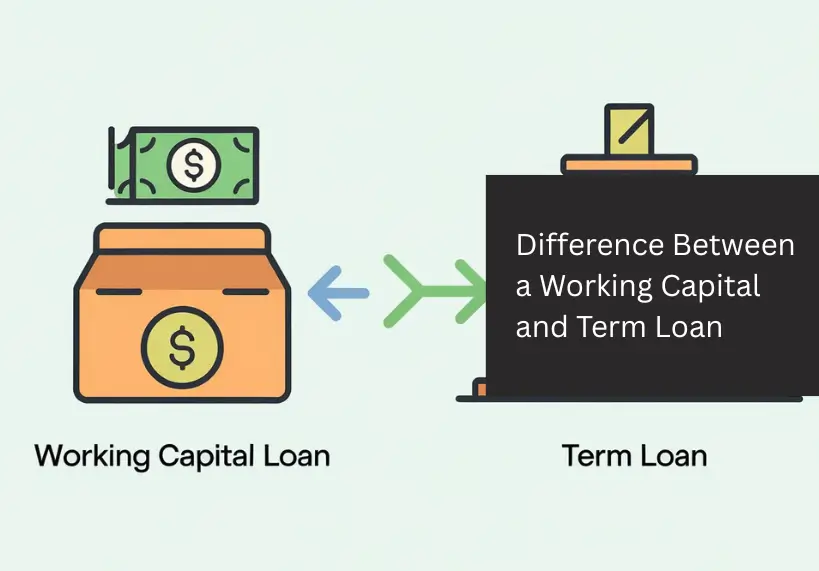
Working capital loans, in essence, are exactly what the name suggests. They are loans that are provided to help finance your business’s daily activities.
Consider this example, suppose a baker receives a massive order for wedding cakes. But they need a large amount of flour, sugar, and eggs immediately to meet the deadline. Unfortunately, their current cash flow is tied up in previous orders. So, what can they do?
In such a situation, the baker can opt for a working capital loan. From purchasing inventory to covering payroll and rent, these loans provide the necessary funds to bridge the gap.
Whether you’re a budding entrepreneur or an experienced business owner, understanding how you can make the best use of working capital loans is essential for long-term success.
What is a Working Capital Loan?
A working capital loan is designed to help businesses manage their daily activities. It helps cover various operational expenses, such as employee salaries, accounts payable, and other short-term financial needs. For businesses that experience fluctuating sales or seasonal patterns, maintaining consistent cash flow can be challenging. This is where a working capital loan comes in and offers the necessary funds to ensure smooth operations.
However, a working capital loan is not meant for business expansion or purchasing assets. Instead, it focuses on addressing short-term financial and operational requirements, allowing businesses to concentrate on their long-term objectives.
Types of Working Capital Loans
In India, businesses have access to various types of working capital loans, which include:
Working Capital Term Loan
A working capital term loan is where the lender provides a sanctioned amount to the borrower after assessing their repayment capability. These loans can be secured or unsecured and are repaid in fixed monthly installments with interest.
Bank Guarantee
A bank guarantee mitigates the risk of non-performance in a business agreement. It ensures that the supplier or buyer will receive payment or services as agreed.
A bank guarantee is a non-fund-based working capital loan, meaning it does not involve the actual transfer of funds but provides assurance of payment. The bank charges a commission and may require some form of security to issue the guarantee.
Bill Discounting
Bill discounting allows businesses to receive finances in advance against confirmed sales orders. If a seller needs immediate cash but has outstanding invoices, they can provide these invoices to a lender at a discounted rate. The lender provides the seller with the funds and then collects the invoice amount from the buyer when it is due.
Letter of Credit (LC)
A Letter of Credit (LC) is used by businesses to secure working capital for transactions. Once a lender issues an LC, the buyer can send it to the supplier.
The supplier can then take the LC to a financial institution, which will discount it and provide the funds after deducting interest. The buyer must repay the amount to the lender within the agreed time frame.
Trade Credit/Line of Credit
Trade credit is an arrangement where the supplier extends credit to the buyer, allowing payment for goods to be made at a later date, usually within 30 to 90 days.
The creditworthiness of the buyer is very important in this situation. This type of credit helps maintain business operations without immediate payment.
Cash Credit & Overdraft
Cash credit and overdraft facilities are commonly used working capital loans. A lender sets up an account for the business, allowing it to withdraw funds up to a predetermined limit.
Interest is charged only on the amount withdrawn, not on the entire limit. These facilities are secured by collateral and require organized financial records for approval. However, the amount sanctioned may not always meet the business’s working capital needs.
Advantages of Working Capital Loans
Below are some of the advantages of working capital loans:
Short Term Loan
Working capital loans are perfect for business owners who need quick access to finances and can repay the loan in up to 48 months. However, the loan tenure varies depending on the financial institution.
The short repayment terms allow businesses to swiftly settle the loan and focus on operations without prolonged financial commitments.
Faster Loan Disbursement
Working capital loans usually require minimal paperwork and have fewer eligibility requirements. This leads to faster approvals and disbursals, usually within 24 to 48 hours of completing the application.
This allows faster access to funds during emergencies and keeps your business running smoothly.
Short Term Loan
Working capital loans are perfect for business owners who need quick access to finances and can repay the loan in up to 48 months. However, the loan tenure varies depending on the financial institution.
The short repayment terms allow businesses to swiftly settle the loan and focus on operations without prolonged financial commitments.
No Collateral Required
Working capital loans usually don’t require pledging collateral. This reduces the risk of losing business assets, making them an attractive option for companies in need of immediate financial support.
Support During Off-Peak Periods
If your business experiences seasonal fluctuations, with profits peaking only during specific times of the year, managing operations during the off-peak periods can be challenging.
This could potentially lead to a downturn in your annual revenue. A working capital loan can help stabilize your cash flow during these lean periods, ensuring that you can cover your operational expenses and maintain smooth business operations.
Factors to consider when choosing working capital finance
When selecting a working capital loan for your business, it’s essential to consider various factors to ensure you choose the best option for your needs.
Firstly, it’s wise to seek independent financial advice to help determine the most suitable method for your circumstances. Assessing your business’s financial health and ability to repay debt is essential before making any funding decisions.
It’s also important to evaluate the cost of different working capital finance options. New methods, such as invoice financing and term loans, can provide quicker and easier access to funds compared to traditional bank loans.
Additionally, consider the effect that working capital finance might have on your business’s credit score and long-term financial stability. Timely repayment is a must; failure to do so can negatively affect your credit score and affect future financing opportunities.
Overall, working capital finance can be advantageous for businesses facing cash flow challenges or looking to expand. However, careful evaluation of all factors and potential impacts is essential for making an informed decision.
Conclusion
Working capital loans help businesses with the necessary funds to cover operational costs. These loans allow businesses to seize opportunities, manage unexpected expenses, and maintain steady growth.
From startups to established businesses that experience seasonal fluctuations, working capital loans can be of great help. By understanding your business’s specific needs and exploring various loan options, you can optimize your financial health
Frequently Asked Questions
Who can apply for a working capital loan?
Any business, regardless of size, can apply for a working capital loan. This includes small businesses, startups, and large corporations. The eligibility criteria may vary depending on the lender.
How does a working capital loan differ from other types of loans?
Unlike other loans used for purchasing assets or expanding operations, working capital loans are intended for short-term needs. They are generally used to manage cash flow and cover everyday expenses rather than for significant investments.
How can a business determine how much working capital it needs?
Businesses can determine their working capital needs by analyzing their cash flow, understanding their operational expenses, and forecasting their revenue. A financial advisor can also help assess the required amount.
What documentation is required for a working capital loan application?
Businesses need to provide financial statements, tax returns, bank statements, a business plan, and proof of revenue. Lenders also require details about business ownership and a credit report.
How does one apply for a working capital loan?
You can apply for a working capital loan through an online lender. You must ensure that the loan app has good reviews, and meet your requirements. LoanTap is an RBI-registered NBFC that provides instant working capital loans at competitive interest rates with flexible repayment plans.







